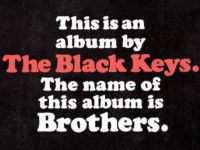by Mark Saleski
We’ll return to that point in a little bit.
A couple of nights ago, I listened to a Fresh Air interview with Patrick Carney and Dan Auerbach of The Black Keys. Much of the interview focused on one of the ways that the band grew their fan base: by selling material for use in commercials and television shows. I have to admit that I’ve pretty much always been against this practice, siding with artists like Tom Waits, who thinks that it destroys the meaning of a song when it appears in an ad. I remember getting into some heated arguments about this issue when The Who started unloading their catalog. It just didn’t seem right.
But Auerbach and Carney made some decent points, the most interesting of which is that FM radio, formerly there to break new artists to the public, no longer serves that function. The Black Keys were getting very little attention on the airwaves, but after selling some music to Nissan (“Set You Free,” from Thickfreakness), they saw it translate to enthusiasm at their live shows. It felt like they had a radio hit, minus the actual radio.
This brings me back to Dylan. I read a review of At Budokan (which the critics seemed to hate) where the writer was incredibly pissed off at Dylan for screwing with his own song structures. We can argue this point’s merits but it does bring up the related issue: Who owns the songs after they’ve been “set free” to the world. Can the artist do whatever he wants with them? Does that include selling them? Restructuring them?
I don’t have any answers, but I can see that the rise of the Internet and changes in all forms of media (not just radio) have made for non-trivial alterations of the former entertainment/media landscape. If the Black Keys needed to leverage the ad market to get noticed, that’s probably not a bad thing.
I guess.
- Why the Rolling Stones’ Harrowing ‘Gimme Shelter’ is Still Revealing New Depths - November 18, 2024
- How Talking Heads’ ‘Fear of Music’ Opened Up a World of Art and Sound - August 5, 2024
- How Deep Cuts Propelled Bruce Springsteen’s ‘Born in the U.S.A.’ - June 4, 2024





Jeff Tweedy said basically the same thing when he sold some songs for a car ad. Can't get Wilco songs on the radio so a television jingle is the next way to get the song out to the masses.
Love Dylan at Budokan.
At Budokan is an interesting artifact. The comparatively mild re-working the familiar material underwent for this tour/these performances/this release makes a kind of sense for the venue, and it is worth noting that he had not produced much new material in the period immediately before this tour. Dylan fronted an 11 member band— eight musicians and three back-up singers, because he is putting this material over in a 14,000 seat arena full of non-English speakers. Sure, his Japanese audience is familiar with the material, but it wasn't going to be the lyrics that were going to sustain the evening. It would be interesting to see a film of this performance, which might give it some context. Although it is not the clap-your- hands-over- your-ears atrocity you might expect, these songs are not notably improved by the addition of saxophone solos or gospel choirs. It is far from the desecration many believe it to be, it must also be said that no one but a Dylan completist needs this on their shelves. That said, I feel I should add that there are rewards to being a Dylan completist, and this set is a fresh way to listen to material that may be so worn smooth by repetition that we sometimes have a hard time hearing it.